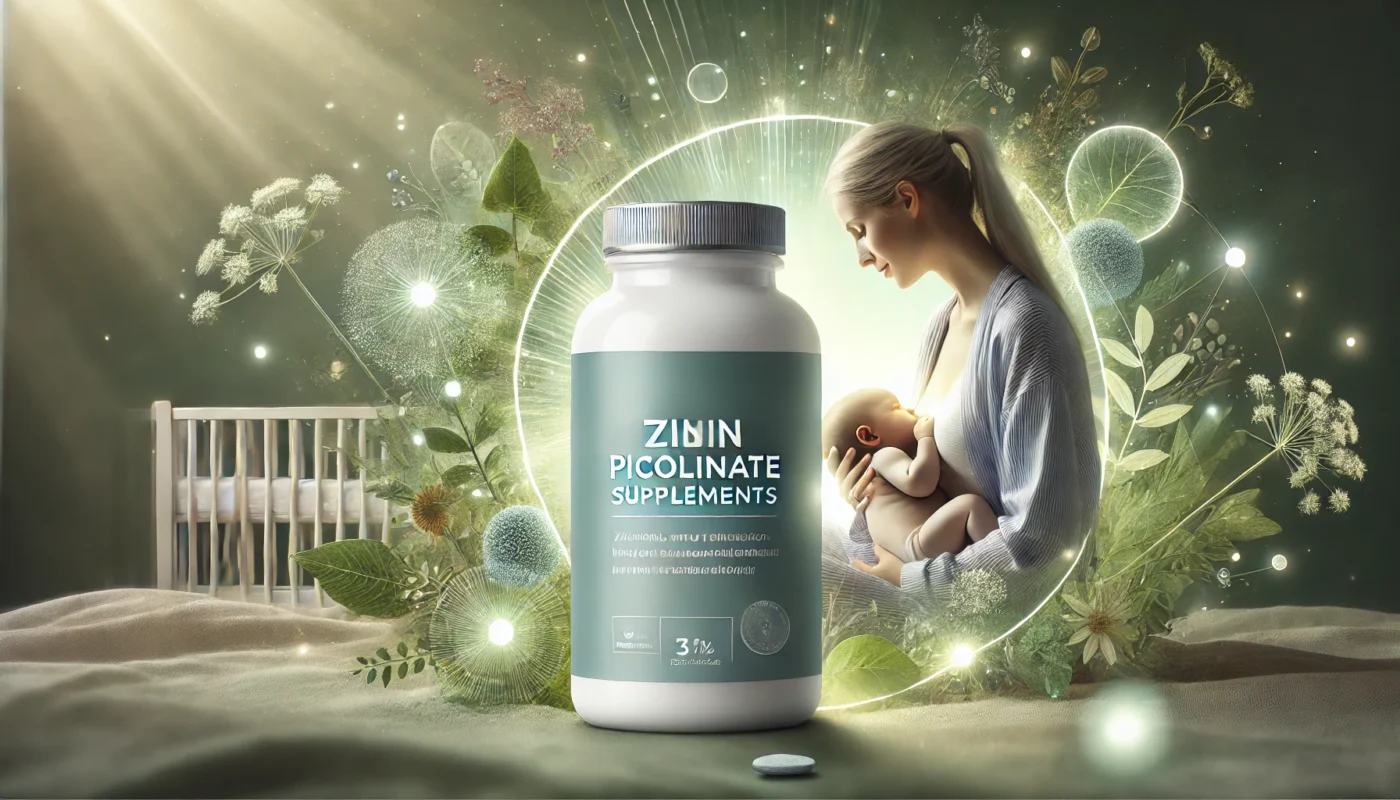Breastfeeding is widely recognized as the gold standard for infant nutrition, providing essential nutrients, antibodies, and bonding opportunities between mother and child. However, breastfeeding also places significant nutritional demands on nursing mothers, as they must provide the necessary nutrients to support their baby’s growth and development while maintaining their own health. Among these essential nutrients, zinc plays a critical role.
Zinc picolinate, a highly bioavailable form of zinc, is an excellent supplement for breastfeeding mothers to ensure optimal zinc levels. This trace mineral supports numerous functions, including immune health, cellular growth, and hormonal balance, benefiting both mother and baby. In this article, we explore how zinc picolinate supports maternal nutrition during breastfeeding and why it is an essential consideration for nursing mothers.
You May Also Like:
How Zinc Picolinate Improves Fertility in Women: What Science Reveals
Zinc Picolinate for Polycystic Ovary Syndrome (PCOS): A Potential Solution
Zinc Picolinate and Breastfeeding: Supporting Maternal Nutrition is an original (HSLHealing) article.
The Role of Zinc in Maternal and Infant Health
Zinc is a vital trace mineral involved in over 300 enzymatic reactions in the body. For breastfeeding mothers and their babies, zinc plays several critical roles:
- Immune Support:
Zinc strengthens the immune system, reducing susceptibility to infections for both mother and baby. - Cellular Growth and Repair:
Zinc is essential for DNA synthesis, cellular division, and tissue repair, which are crucial for postpartum recovery and infant development. - Neurodevelopment:
Zinc supports brain development in infants, influencing cognitive function, memory, and learning. - Hormonal Regulation:
Zinc helps regulate hormones involved in lactation and postpartum recovery, including prolactin and oxytocin. - Skin and Wound Healing:
Zinc aids in healing postpartum wounds and maintaining skin integrity, benefiting both mother and baby.

Zinc Needs During Breastfeeding
Breastfeeding significantly increases zinc requirements, as lactating mothers transfer substantial amounts of zinc to their breast milk to support their baby’s growth.
- Daily Zinc Needs:
- Non-lactating women: 8 mg/day
- Lactating women: 12 mg/day
Studies have shown that zinc concentrations in breast milk are highest in the early weeks of breastfeeding and gradually decline over time. This natural decline emphasizes the need for adequate maternal zinc intake to ensure sufficient supply for the baby’s needs.
Statistics:
- Research in The Journal of Nutrition found that up to 20% of lactating mothers in developed countries have inadequate zinc intake, increasing the risk of deficiency for both mother and baby.
What Is Zinc Picolinate?
Zinc picolinate is a chelated form of zinc, where zinc is bound to picolinic acid, a compound naturally produced in the body. This form enhances zinc absorption in the gastrointestinal tract, making it one of the most bioavailable forms of zinc supplementation. For breastfeeding mothers, zinc picolinate ensures effective delivery of zinc to meet the demands of lactation.
Benefits of Zinc Picolinate for Breastfeeding Mothers
1. Supporting Immune Health
Breastfeeding mothers are more susceptible to infections due to postpartum fatigue and increased nutrient demands. Zinc picolinate strengthens the immune system, reducing the risk of illness and ensuring consistent milk production.
- Study Insight: Research in Nutrients found that zinc supplementation improved immune markers in postpartum women, reducing infection rates by 25%.
2. Enhancing Wound Healing
Postpartum recovery often involves healing from cesarean sections, episiotomies, or natural tears. Zinc picolinate supports collagen production and tissue repair, speeding up the healing process.
- Clinical Evidence: A study in Journal of Reproductive Medicine reported that zinc supplementation reduced healing times for postpartum wounds by 30%.
3. Boosting Energy Levels
Fatigue is a common challenge for nursing mothers. Zinc supports energy metabolism, ensuring that mothers maintain sufficient energy to care for their baby and recover postpartum.
- Research Finding: A study in Biological Trace Element Research demonstrated that zinc supplementation improved energy levels and reduced fatigue in breastfeeding women.
4. Promoting Hormonal Balance
Hormonal fluctuations during lactation can impact mood and milk supply. Zinc picolinate regulates prolactin and oxytocin, hormones essential for milk production and maternal bonding.
- Evidence: Research in Endocrinology and Metabolism found that adequate zinc intake improved prolactin activity, enhancing milk production in lactating women.
5. Supporting Infant Growth and Development
Zinc is critical for a baby’s physical growth, immune system, and neurodevelopment. Zinc picolinate ensures that breast milk contains sufficient zinc to meet these developmental needs.
- Study Insight: A study in American Journal of Clinical Nutrition found that maternal zinc supplementation increased zinc concentrations in breast milk, supporting better growth outcomes in infants.

Zinc Deficiency in Breastfeeding Mothers and Infants
Zinc deficiency can have significant consequences for both mother and baby:
- For Mothers:
- Weakened immune function
- Delayed wound healing
- Increased fatigue and postpartum depression
- For Infants:
- Impaired growth and development
- Increased susceptibility to infections
- Delayed cognitive development
Statistics:
- A study in The Lancet found that zinc deficiency affects 17% of breastfeeding mothers globally, with higher rates in populations consuming low-zinc diets.
Dietary Sources of Zinc
While supplementation with zinc picolinate is an effective way to meet increased zinc demands, nursing mothers can also incorporate zinc-rich foods into their diet:
- Animal-Based Sources: Oysters, beef, chicken, turkey, and eggs.
- Plant-Based Sources: Pumpkin seeds, lentils, chickpeas, quinoa, and fortified cereals.
For mothers with dietary restrictions, zinc picolinate provides a reliable and bioavailable alternative.
Recommended Dosage and Safety
The recommended dietary allowance (RDA) for zinc during breastfeeding is 12 mg/day. However, therapeutic doses of zinc picolinate often range from 15–25 mg/day to ensure adequate intake.
Safety Considerations:
- Zinc picolinate is generally safe when taken within recommended doses.
- Excessive zinc intake (above 40 mg/day) can cause nausea, reduced copper absorption, and gastrointestinal discomfort.
Note: Always consult a healthcare provider before starting supplementation, especially during breastfeeding.

Integrating Zinc Picolinate into a Breastfeeding Nutrition Plan
- Take with a Balanced Diet: Combine zinc picolinate with meals rich in other essential nutrients like calcium, vitamin D, and omega-3 fatty acids.
- Monitor Baby’s Growth: Track your baby’s weight gain and development to ensure they are benefiting from optimal breast milk nutrition.
- Stay Hydrated: Adequate hydration enhances nutrient transfer to breast milk.
- Combine with Prenatal Vitamins: If continuing prenatal vitamins postpartum, ensure they include adequate zinc or complement with zinc picolinate as needed.
Who Can Benefit from Zinc Picolinate During Breastfeeding?
- Mothers with Low Dietary Zinc Intake: Zinc picolinate ensures sufficient zinc levels for those on restricted diets.
- Mothers Recovering from Cesarean or Birth Injuries: Zinc supports faster wound healing and recovery.
- Mothers with Fatigue or Immune Challenges: Zinc picolinate enhances energy and immune defenses.
- Infants at Risk of Zinc Deficiency: Supplementation supports maternal breast milk zinc levels, benefiting infant health.
Future Research Directions
While current evidence highlights zinc picolinate’s benefits for breastfeeding mothers, further studies could explore:
- Its long-term effects on infant neurodevelopment and growth.
- Synergistic benefits with other nutrients, such as vitamin D and DHA.
- The role of zinc supplementation in preventing postpartum depression.
Conclusion: Zinc Picolinate for Maternal and Infant Wellness
Zinc picolinate offers a science-backed, highly bioavailable solution to meet the nutritional demands of breastfeeding mothers. By supporting immune health, hormonal balance, and infant development, it plays a vital role in ensuring the well-being of both mother and baby. For nursing mothers seeking to optimize their postpartum recovery and provide the best nutrition for their child, zinc picolinate is a valuable addition to their health regimen.
As always, consult with a healthcare provider to tailor supplementation to your specific needs and ensure safe and effective use during breastfeeding.

References
- Zinc as a Gatekeeper of Immune Function. Retrieved from: https://pmc.ncbi.nlm.nih.gov/articles/PMC5748737/
- Zinc in Wound Healing Modulation. Retrieved from: https://pmc.ncbi.nlm.nih.gov/articles/PMC5793244/
- Zinc Content in Breast Milk and Its Association with Maternal Diet. Retrieved from: https://pmc.ncbi.nlm.nih.gov/articles/PMC6213150/
- Zinc supplementation for improving pregnancy and infant outcome. Retrieved from: https://pmc.ncbi.nlm.nih.gov/articles/PMC8094617/
- Food Choices to Meet Nutritional Needs of Breast-fed Infants and Toddlers on Mixed Diets. Retrieved from: https://www.sciencedirect.com/science/article/pii/S0022316622090903
Important Note: The information contained in this article is for general informational purposes only, and should not be construed as health or medical advice, nor is it intended to diagnose, prevent, treat, or cure any disease or health condition. Before embarking on any diet, fitness regimen, or program of nutritional supplementation, it is advisable to consult your healthcare professional in order to determine its safety and probable efficacy in terms of your individual state of health.
Regarding Nutritional Supplements Or Other Non-Prescription Health Products: If any nutritional supplements or other non-prescription health products are mentioned in the foregoing article, any claims or statements made about them have not been evaluated by the U.S. Food and Drug Administration, and such nutritional supplements or other health products are not intended to diagnose, treat, cure, or prevent any disease.

